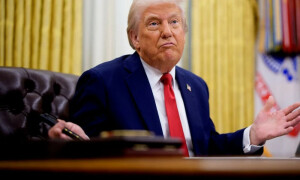Ishaq Dar, while addressing a seminar at the launching ceremony of the first ever annual report of the Institute of Public Policy of Beaconhouse National University, a few hours prior to the decision to resign as the Finance Minister was taken, hinted at the possibility of the imposition of a wealth tax.
Dr Hafiz Pasha, addressing the same forum, lamented the fact that the abolition of wealth tax and reduction in tax rates had resulted in a net loss to the exchequer of Rs 300 billion. Over the last five years tax collection has gone up substantially on account of tax reforms; however, tax-to-GDP ratio instead of showing improvement has come down. The target for a two percent improvement still looks distant.
The exchequer is sorely in need of massive injections of revenue at the present moment in time. The disturbing fact is that the economy is in a downward spin, made possible due to the multiplier effect, as the rate of growth of the economy slows. This will also negatively impact on revenue collections in the forthcoming fiscal year.
Until and unless additional taxes are imposed or the ambit of existing ones enhanced, there is likely to be a decline in revenue generation which would put further pressure on the ability of the government to ensure basic essentials for the poor. It is also fairly evident as to why the obvious choice for a popularly elected government would have been the wealth tax: its very name that smacks of an equitable tax that is levied only on the rich. However this is merely a misconception.
Wealth tax has been abolished in most countries of the world, including Pakistan, for one simple reason: it is seen as a disincentive for those involved in the process of investment and thereby wealth creation - a process that generates employment opportunities as well as propels the growth rate of the economy that, in turn, leads to higher tax collections.
In contrast, imposition of wealth tax may well lead to capital flight while, at the same time, act as a disincentive to increasing levels of investment. Thus wealth tax in the long run is a self-defeating exercise if the objective is to promote economic activity in the private sector or increase revenue generation, as it appears to be as far as the present government is concerned.
If one adds the element of a large illegal parallel economy operating in Pakistan one is confronted with the fact that there are disincentives in the tax structure that have led to several entrepreneurs opting to stay out of the legal economy.
In this scenario to consider imposing a tax on wealth may well spur a growth in the undocumented sector of the economy and be detrimental to achieving the overriding objectives: an increase in employment opportunities, lower inflation and higher revenue.
Since there is very little time left for finalisation of Budget FY09, the challenge for the budget makers is on the revenue side while expenditure heads are well known. The Pasha report has rightly advised imposition of regulatory duty on non-essential imports estimated at around 20 billion dollars.
Five percent regulatory duty will fetch Rs 100 billion. Coupled with a cut in PSDP by Rs 100 billion will reduce the fiscal gap by two percent of GDP. Absorption capacity for full utilisation of PSDP is not there anyway. The ambit of federal excise duty covering the services sector needs to be expanded.
Higher collection on this account will help fetch more revenue for the provinces. We cannot have capital gains tax on equities together with capital value tax on shares traded. Wealth tax cannot generate more than Rs 4 to 5 billion. This must be avoided at all costs. Creation of wealth should be encouraged. Wealth is created from income after payment of tax. Therefore, income irrespective of source needs to be taxed to expand the tax base and improve the tax-to-GDP ratio.
Tax composition normally varies with the nature of the political regime in place. Socialist regimes tend to make more use of wealth, corporate, sales, and excise tax sources than other regimes. This is possibly due to the greater ease with which the activity of businesses can be monitored, and a stronger ideological interest in taxing businesses and wealth.
Empirical studies have also shown that more repressive governments rely less on personal income taxation, possibly because this tax source requires a higher degree of voluntary compliance than other forms of taxation. It is relevant to note that Pakistani governments, be they military dictatorships or democratic forms, have not amended the tax system dramatically to match their politics.
Their focus has been on increasing revenue generation. Our governments have also invariably turned towards multilateral banks for advice and this may have been the reason behind greater reliance on sales tax as a revenue source over the past two decades. What is required is for an in-house assessment of various forms of possible taxation that must include private sector economists and analysts to determine how best to proceed to increase revenue.
BR100
12,239
Decreased By
-154.2 (-1.24%)
BR30
36,393
Decreased By
-714.3 (-1.92%)
KSE100
114,153
Decreased By
-1379.3 (-1.19%)
KSE30
35,200
Decreased By
-461.3 (-1.29%)





















Comments
Comments are closed.